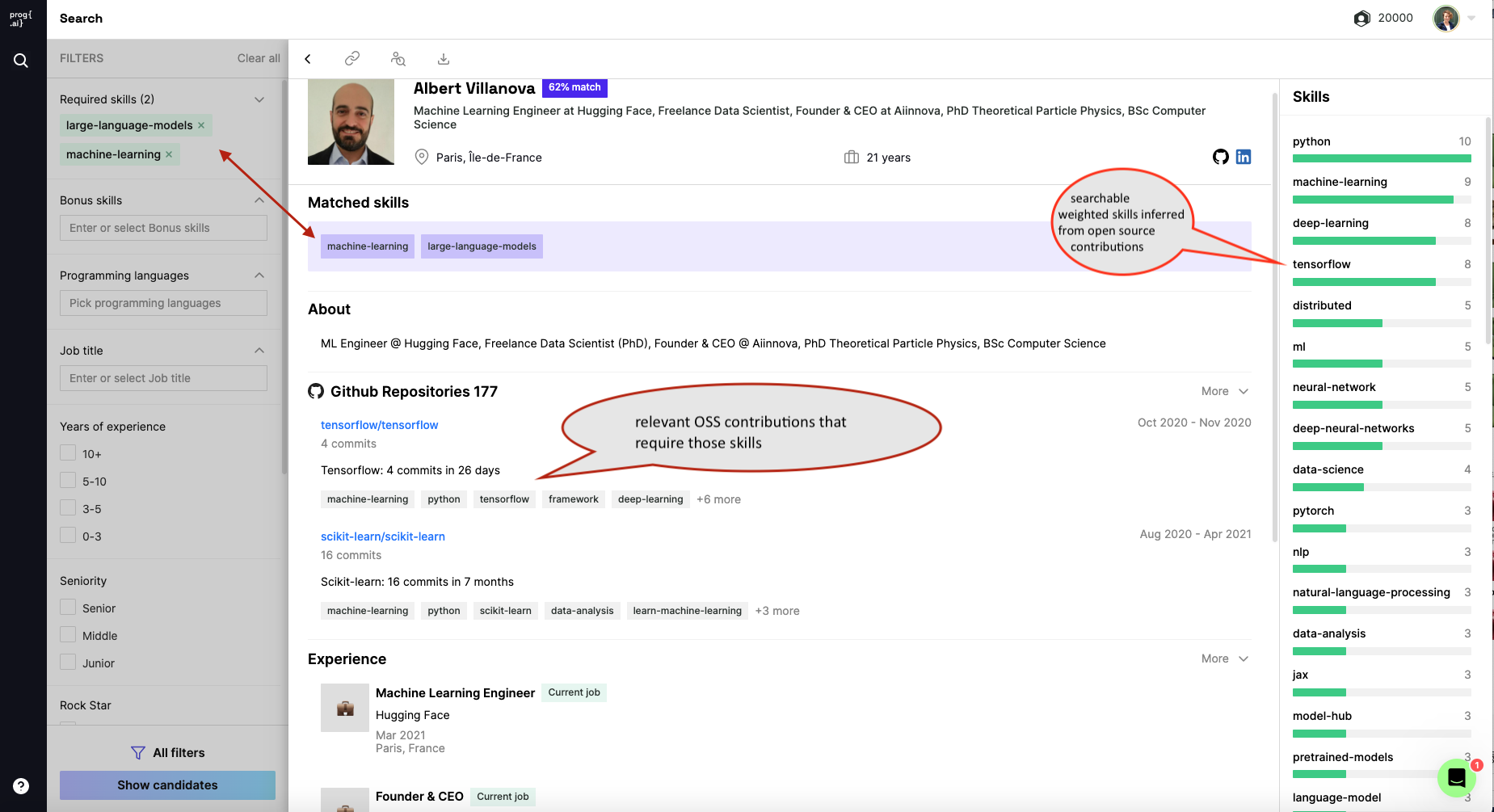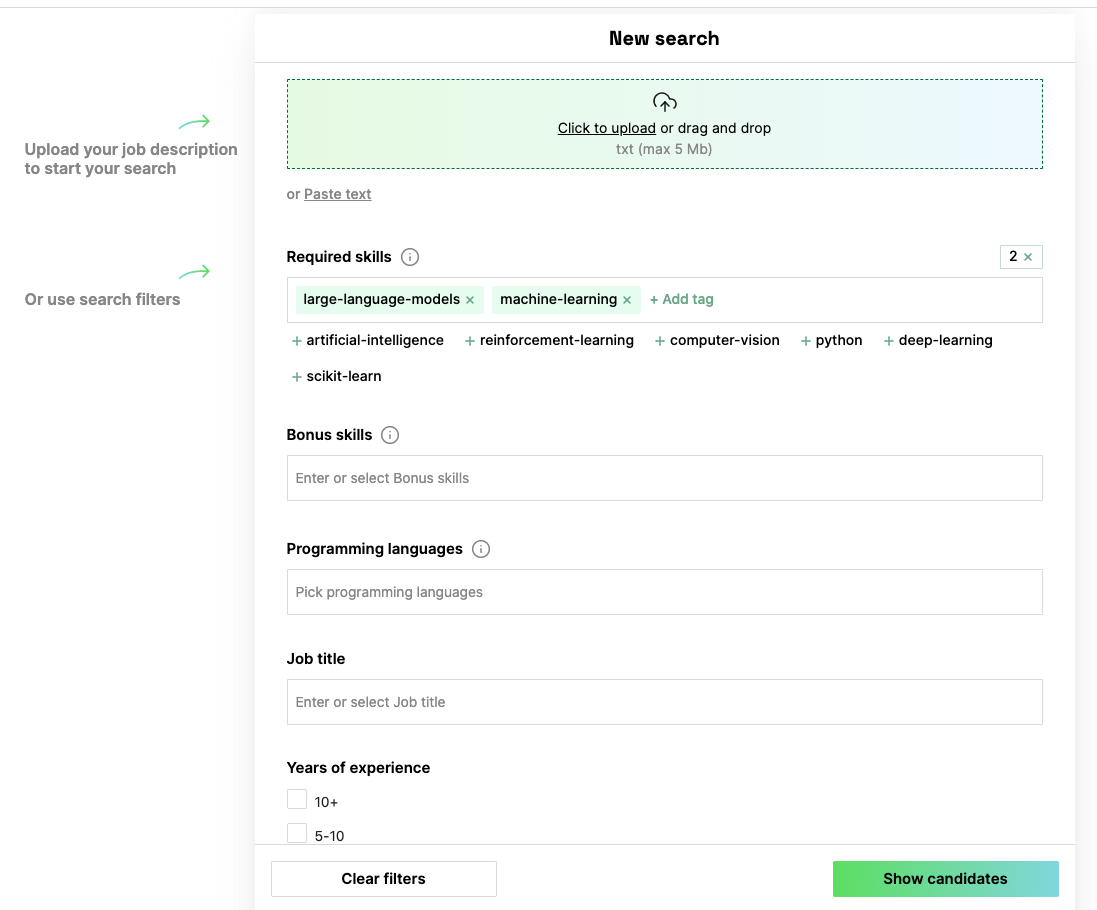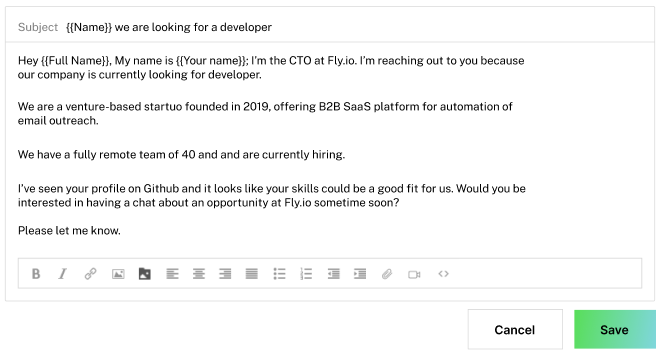Companies already have a wealth of tools at their disposal for headhunting technical talent, but a new startup wants to give recruiters a leg-up by bringing together the worlds of GitHub and LinkedIn to create a database of the most suitable candidates for a specific software development role — and it’s doing so by using AI to “infer” skills from code they’ve written.
Prog.ai, as the company is called, allows recruiters to search for developers based on their technical skills, libraries they have used or simply the contributions they have made to projects on GitHub.
Founded out of San Francisco in 2022, Prog.ai is the brainchild of CEO Maria Grineva, who sold a previous data startup called Orb Intelligence to Dun & Bradstreet back in 2020; CTO Fedor Soprunov, previously a machine learning researcher at Russian tech titan Yandex; and product head Dmitry Pyanov, who has worked in product teams at companies including Yandex and Replika.
While hiring is the company’s primary focus initially, with its inaugural product opening for recruiters in closed beta this week, Grineva sees a broad gamut of use cases beyond helping companies fill technical roles. This includes fostering developer relations, such as asking them to join a community or inviting them to contribute to an open source project; requesting their expertise for a specific problem; and even to help developer tool companies pitch their wares.
“This week we’re launching Prog.ai for tech recruiters, and in April we are going to extend our SaaS offering with Prog.ai for developer relations to help companies that build tools for developers to understand their TAM (total addressable market), learn more about their existing developer community, and reach their target audience,” Grineva explained to TechCrunch.
To help kickstart its commercial push, Prog.ai today announced that it has raised $1 million in pre-seed funding from Germany-based angel fund Angel Invest, Brooklyn Bridge Ventures and a slew of angel backers, including one of Spotify’s first employees and its former CTO, Andreas Ehn.
Analyze that
So how does Prog.ai actually go about inferring skills from public source code? Well, in the first instance, the platform actions GitHub’s “git clone” command, which creates a copy of millions of public repositories and branches. Prog.ai then analyzes each git commit, and inspects the code snippet, file path and the subject of the commit to figure out what it is about.
“For a given project, we can see who is the core architect, who develops the back end or front end, who focuses on the UI/UX, who builds the QA and tests, and who are the technical writers,” Grineva said.
Prog.ai also pores over git actions such as pull requests, including rejections and approvals, comments and issue openings, which serves to help Prog.ai “understand” the different roles and engagement levels of the project contributors.
“We process not only famous open source projects, but also ‘pet’ projects, tests, forks and even training projects from Coursera or Udemy that engineers keep public on GitHub,” Grineva added. “All together, we are processing about 1 billion commits on GitHub per year to get a very accurate profile of the skills of every engineer.”
Under the hood, Prog.ai leans on OpenAI’s GPT, tailoring the much-hyped language model on high-profile open source projects and StackOverflow articles to help it derive scores on code quality, for example.

Prog.ai users can build lists of top experts in specific disciplines, such as “large language models” or “computer vision,” and generate a leaderboard of top performers in any given field. Or they can submit a list of repositories and create a ranking of all the contributors by the number of commits that they have made.
Effectively, recruiters and companies can tailor their search to whatever parameters they want, including areas of skill, programming languages and number of years of experience.

But understanding code is only a part of Prog.ai’s offering.
A core selling point for recruiters is the ability to connect with software developers, and for that Prog.ai packs a built-in email outreach engine, powered by sales engagement platform Reply.io.
“Users use our search to create a list of relevant candidates, and then they can create a personalized email sequence, mentioning candidates by name, referring to their projects and explaining why they think a job position is a good fit for them,” Grineva said.

Recruiters will also probably want a more rounded view of a developer’s skills, education and employment history, which they probably won’t get from GitHub. This is where LinkedIn enters the fray, with Prog.ai gleaning publicly available data and aligning it with the corresponding individual from GitHub. And this is what Grineva says is the platform’s special sauce — by meshing data from two widely used platforms, it can build a finer-grained picture of potential candidates.
“I believe joining GitHub and LinkedIn profiles brings a lot of value, since engineers are typically not very good at promoting themselves and often don’t even have complete LinkedIn profiles,” Grineva said. “Furthermore, on LinkedIn, people self-describe themselves, which means that the information is subjective. Applying a standard methodology to infer the skills of all engineers based on their actual code contributions not only removes the subjectivity, but also means that companies will be able to evaluate candidates uniformly.”
Matchmaker
Of course, none of this offers a perfect recruitment conduit. Bringing together two gargantuan, disparate datasets is no easy feat, and there is likely a lot of room for error here, with similar names and histories raising the potential for conflating profiles. And that’s assuming that a person has a LinkedIn profile in the first place, which they absolutely might not. But under the hood, Grineva said they have put measures in place that go some way toward addressing at lease some of those potential pitfalls.
“Matching two large datasets is not an easy task, since the information people make available on GitHub can be sparse, with many engineers choosing to be anonymous on GitHub,” Grineva explained. “We have built a proprietary fuzzy-matching system that takes into account not only names, usernames and email addresses, but also matches places of work, expertise, interests.”
On top of that, Grineva said that they use computer vision to compare profile avatars across platforms, which while not fool-proof on its own, serves as an extra tool alongside its other verification mechanisms.
At the time of writing, Prog.ai claims to have the contact information from around 70% of all profiles in its database, which obviously means that 30% are lacking that crucial data. To that point, Grineva said that while they hope to improve its contact detail coverage as it expands, its potential use cases won’t always revolve around reaching out.
“Another important use case is data-enrichment,” she said. “Customers can look up full candidate profile by GitHub handle, LinkedIn URL or contact email — in this case, we can only match to those 70% where we have the email.”
There’s also the giant elephant in the room here: Isn’t Prog.ai simply facilitating “cold-callers” looking to contact developers en masse?
“There is a risk, but it’s important to first recognize that recruiters are already trying to cold-call developers and this is currently happening via other tools, as well as some tech recruiters manually extracting contact information directly out of GitHub,” Grineva said. “That said, recruiters are currently doing this with bad or limited insights about the developers they are reaching out to, which means that the outreach is not personalized and often the opportunity is not a fit for the developers. As a result, these emails come across as spam.”
For those on the receiving end of a Prog.ai-powered reachout campaign, Grineva noted that the platform is “fully GDPR compliant,” and developers are able to ask it to remove or edit their profiles, as well as opt-out entirely from email outreach.
Show me the money
It’s still early days for Prog.ai and it’s experimenting with different plans, but the company is essentially operating a SaaS-based subscription model, with pricing based on the number of contacts a user accesses. This starts at “free” for up to 100 contacts per month, all the way up to a “recruiter” plan, which is $530 per month for advanced search features and 3,000 contacts. It also offers an enterprise plan with custom pricing, which is available on request.
There’s also no ignoring the myriad other hiring solutions out there, spanning everything from LinkedIn’s very own Talent Solutions product, through Zoominfo, SeekOut, TalentOS and HireEZ. But Grineva says Prog.ai’s focus purely on technical talent, and its GitHub scanning smarts, is what sets it apart from the crowd. In turn, this could mean better-targeted headhunting efforts, where a recruiter and candidate’s goals are more closely aligned.
“Being an engineer myself, I receive a lot of messages from recruiters that are not relevant for me and see this problem firsthand,” Grineva said. “I believe that this is primarily a data quality issue: Recruiters just don’t have enough information about me to match me to interesting opportunities. Our goal is to reduce the level of noise developers receive today. By providing recruiters with better information, we believe that this will be a win-win for both developers and recruiters.”































Comment